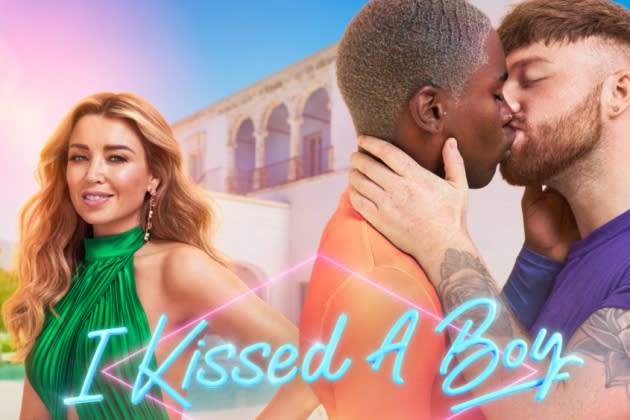‘I Kissed a Boy’: Why the U.K.’s First Gay Dating Show Is a Reality Gamechanger
- Oops!Something went wrong.Please try again later.

The U.K.’s first gay dating show is about to air on BBC Three. “I Kissed A Boy,” fronted by Dannii Minogue, features 10 single men hoping to find love in a sunny villa in Italy.
Wait. Hang on. It’s 2023. How is this the U.K.’s first ever gay dating show? LGBTQ+ representation on television has changed immeasurably in the past decade — just look at E!’s “The Bi Life” and Netflix’s “Heartstopper.” It used to be that gay relationships were only explored after the watershed or in soap storylines, but these stories are now more mainstream than ever. Why has it taken this long for the U.K. to produce its first gay dating series?
More from Variety
'Doctor Who' Goes Back to the '60s in New Look at Ncuti Gatwa, Millie Gibson
BBC and NBCUniversal Co-Commission Belgian Travel Reality Competition Show 'Destination X'
Of course, British dating shows do feature LGBTQ+ contestants. Channel 4’s “First Dates,” MTV’s “Ex on the Beach” and E4’s “Married at First Sight” have all featured LGBTQ+ participants. Breakups have been explored as well, thanks to BBC Three’s “Eating with My Ex.” Yet, as reflective as these shows might be, LGBTQ+ contestants usually feature on these shows alongside straight participants.
Take “Love Island,” for example. The ITV2 dating show has been scrutinized for not making the format inclusive to LGBTQ+ dating. Producers have argued that the format, in which contestants dump their partner and choose another, makes it hard for it to work. While some viewers accept such reasoning, what didn’t help the show’s reputation was when an ITV commissioner in 2021 referred to the possibility of having LGBTQ+ contestants as a “logistical difficulty.”
Enter “I Kissed A Boy,” which features 10 gay guys being matched, all of whom have the opportunity to kiss their partner when they first meet.
“When you’ve only got one gay couple in a show where there are five other straight couples, those people represent what it’s like to be gay,” says David Brindley, chief creative officer at Twofour, who made “I Kissed A Boy.” “But when you’ve got 10, 12 lads, you get an incredibly broad spectrum of what it’s like and what people’s tastes and experiences are like.”
And for those wondering, despite being set in a villa, “I Kissed A Boy” isn’t just “Love Island” with solely gay contestants.
For one thing, unlike “Love Island,” the series is more inclusive when it comes to body diversity. There’s also a strong emphasis on representation, with contestants cast across the regions and nations, from cities to the countryside, as people’s experiences and public attitudes towards LGBTQ+ identities vary across the U.K. There’s also an emphasis on featuring different backstories and coming out experiences, in order to highlight to viewers that there’s no typical way to be gay, nor should there be. There was also a high representation of gay people within the production team, which the show hopes will add to the show’s authenticity.
“What we didn’t want to do was take a straight format and pump a gay cast through it,” says Brindley. “We wanted to have something completely bespoke. There’s lots of moments in the show that you could only see with a gay cast. The most important thing to us was to make sure that it was able to be bespoke and unique for the people that were going to be taking part — and also that the audience recognized something very different in it.”
Ultimately, when it comes to young audiences, more people are interested in LGBTQ+ dating than you might expect. Recent census data shows that young people between the ages of 16 and 24 are now twice as likely to identify as part of the LGB+ community than the rest of the population. And many younger people choose not to use a label to describe their sexuality at all.
“For us, [‘I Kissed A Boy’] was a very exciting no-brainer,” said Fiona Campbell, controller for youth audiences at BBC Three and BBC iPlayer. “We obviously have a very well-established audience base, fan base and social media buzz around our ‘Drag Race’ content and around our documentaries that we do about sexuality and identity, so we definitely have an audience who would be receptive and celebratory of this. It didn’t feel in any way a risk.”
And having watched a few episodes, this is what adds depth to “I Kissed A Boy”: It might not sound like much, but watching guys talk across a whole group, rather than one-on-one, about their crushes, about their types, coming out, their upbringing, their families and their exes, is profound. As it’s an exclusive gay world that these contestants are living in, there’s no unintentional holding back from anyone, nor any explanation needed for a straight contestant who might not get the reference or lived experience. It’s something you might feel when you’re within an exclusively LGBTQ+ group — a switch in your head goes off.
“I Kissed A Boy” also makes you realize that other LGBTQ+ dating formats — not only about gay men — deserve to be explored. There are hints of movement elsewhere, with Netflix’s “The Ultimatum: Marry or Move On,” being cast with exclusively queer and non-binary contestants, on the way, but more dating formats from this community deserve to be explored. If you see your identity represented on screen, or expressed in a myriad ways, it makes you feel seen. And that can only be a good thing.
“I Kissed a Boy” airs on BBC Three this summer.
Best of Variety
This 'Fast and Furious' Arcade Cabinet Allows You to Step Behind the Wheel as Dom Toretto
Emmy Predictions: TV Movie - 'Fire Island' and 'Reality' Bring Fresh Takes to the Category
Sign up for Variety’s Newsletter. For the latest news, follow us on Facebook, Twitter, and Instagram.
